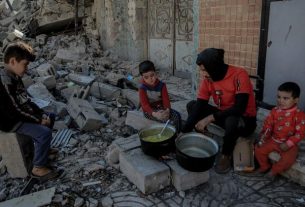The general elections in South Africa (SA) took place on Wednesday and were the seventh democratic elections held in the country since the end of the oppressive Apartheid regime. While most SA citizens could exercise their constitutional right to vote in a democratic country, SA citizens who are currently in Israel could not do so.
As reported by The Jerusalem Post in November, Israel’s embassy in Pretoria, South Africa, was temporarily closed, with the chief whip of the African National Congress (ANC) amending the parliamentary resolution to include: “… until a ceasefire is agreed to by Israel, and Israel commits to binding United Nations-facilitated negotiations whose outcome must be a just, sustainable, and lasting peace.”
Additionally, a few days before the vote the SA embassy in Israel was “closed for business … until further notice,” as stated on their website. According to The South African Jewish Board of Deputies (SAJBD,) the embassy closed “suddenly … with no provisions.” The embassy’s sudden closure created many issues for SA citizens who are currently residing in Israel, and the SAJBD worked “continuously with International Relations to assist some of these people resolve serious issues including emergency passports, getting documents and a very ill baby requiring an ID for medical care,” it noted to the Post.
In addition to the “serious issues” the SAJB referred to, according to a press release on behalf of the South African Zionist Federation (SAZF,) South Africans in Israel (Jewish and non-Jewish,) were unable to vote in their national elections since both the Department of International Relations and Cooperation (DIRCO) and the Electoral Commission (IEC) failed to inform the public that the temporary closure of the voting mission would not be lifted in time for the elections which were supposed to take place between 17-18 May.
Double standards applied to South African citizens in Israel and the territories
Moreover, since the deadline to change one’s voting station was on 22 April 2024, South African citizens in Israel, which includes members of the Jewish, and Christian communities and South Africans studying at Israeli universities, were left in a position where they could not have made any alternative arrangements to vote elsewhere, according to the press release.
The SAZF argued that the decision to suspend the SA embassy in Israel while the mission in Ramallah remained open is “irrational, especially when taking into account that only 5 South Africans voted in Ramallah in the 2019 National Elections.”
“We did ask SA citizens in Israel to at least register to vote, to put pressure on the IEC but alas there was no major registration from the potential 10,000 who could have voted,” Jewish Cape Town councilman and Democratic Alliance (DA) member Errol Antsey told the Post.
Furthermore, DA member and parliament member Werner Horn spoke with the IEC to have the embassy in Israel reopened for the elections and took the subject of voting at Consular offices to court. However, despite winning in court, “nothing transcribed into action, hence a low voter turnout abroad,” noted Councilman Antsey to the Post.
The SAZF stated that while DIRCO repeatedly criticized Israel for denying Palestinians their rights, “it is ironic that the SA government is willing to deny their own citizens’ rights when it is politically beneficial for them to do so,” and urged the SA government to correct the “grave injustice,” and allow all SA citizens, indiscriminately, to exercise their constitutional right to vote.
“Voting is one of the constitutional obligations of our government to its citizens abroad and depriving them of this facility is unacceptable,” the SAJBD stated to the Post.
A SA citizen, writer, and researcher at Ben Gurion University Kenneth Mokgatlhe expressed his opinion and said, “It is so disappointing to me that I will not be able to execute my national duty to vote for my desired government.
“For the first time since I was eligible to vote in the 2009 general elections, the ANC government will make it impossible for South African citizens in Israel to cast their vote to bring about much-needed change in government. I was told by IEC officials that I should go to other missions outside Israel to vote, such as Ramallah, Amman, or Cairo,” as cited in SAZF’s press release.
National Chairman of the SAZF Rowan Polovin noted that regardless of the “severe impracticalities” of voting in another location, “the democratic principle should be paramount.” He further argued that was the government’s responsibility to “empower” their citizens “to exercise their basic voting rights, rights which are at the very heart of any free country.”
According to Councilman Antsey, the SA embassy in Israel had not resumed operations for the elections due to a decision that “there will be no voting in a declared war zone, so no voting arrangements were made in Israel and Ukraine.” He further stated, “There is no doubt the ANC is aware that most people abroad will not vote for them so there was no urgency on their part to open more voting stations and certainly in Israel and used all the delay tactics to prevent SA from voting.”


